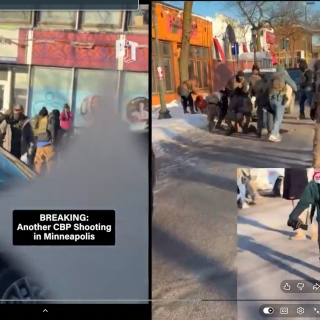The protests in the summer of 2020 after the murder of George Floyd focused attention on the interaction of police and the Black community. Protestors accused Columbus Division of Police officers of multiple use of force violations. Several internal and external investigations, trials, and lawsuits are still pending. The Division’s internal investigations are conducted under the supervision of Mark Gardner, the Commander of the Internal Affairs Bureau.
Gardner and other supervisors have expressed the notion that many protestors are affiliated with an “organized group” called Black Lives Matter (BLM) in internal documents obtained through records requests. They also expressed opinions that BLM is or should be on the City’s official list of hate groups.
“It is concerning that the person who is in charge of Internal Affairs, the bureau that is responsible for investigating the complaints filed by the protestors, also believes that Black Lives Matter is a hate group,” said Columbus police Lt. Melissa McFadden, speaking as a private citizen.
As many are aware, Lt. McFadden gained national attention late in 2020 when she published “Walking The Thin Black Line,” a memoir describing her 25-year effort to confront racism and unprofessionalism within the Division, and the retaliation from fellow officers that followed.
On June 25, 2020, Columbus City Council announced an initiative to conduct background checks of existing officers to screen for hate group affiliation. One of the first reforms enacted by council in the wake of the protests asked officers to pledge not to join hate groups. The phrase “I will not affiliate with a defined hate group” was approved by City Council on July 27, 2020.
But before “I will not affiliate with a defined hate group” was officially added to a Columbus police officer’s oath, a supervisor sought to encourage the Fraternal Order of Police Capital City Lodge #9 to try to convince City Council into designating Black Lives Matter a hate group, and thus denoting them akin to the Ku Klux Klan.
“Can BLM be added as a defined ‘Hate’ group based on the violent protests?” wrote Lt. Duane Mabry the Staff Inspections Lieutenant of the Professional Standards Bureau to Mark Fester on August 12, 2020, Fester being the Fraternal Order of Police Capital City Lodge #9’s lead contract negotiator. The reporter for this story could not verify whether Cap City Lodge #9 requested City Council to designate BLM a hate group.
On November 6, 2020, “I will not affiliate with a defined hate group” was officially added to the officers’ oath and released as a Division directive.
Four days later, Internal Affairs commander Gardner filed a complaint with Assistant Safety Director Kathleen Bourke falsely accusing Lt. McFadden of being a member of a hate group based on a picture posted by the now defunct Facebook group, Black Lives Matter – Columbus, from 2019 when she was photographed at a Martin Luther King free breakfast sponsored by Police Officers for Equal Rights.
Gardner wrote that McFadden “appears to be affiliating herself with a group that falls under the newly defined ‘hate group’.” He stated he filed his report under the requirement to report possible misconduct of fellow officers.
He also referenced the fact that she said the words, “Black Lives Matter” at a racial justice rally at police headquarters on October 22, 2020.
Commander Gardner declined our request for comment on his complaint.
In her ruling Bourke wrote that, “Gardner does not provide adequate evidence to suggest that McFadden is a member of Black Lives Matter.” Bourke also noted in her response to Gardner’s complaint that even if there were proof of McFadden’s membership, the Southern Poverty Law Center does not list Black Lives Matter as a hate group.
Mabry had also cited the Southern Poverty Law Center in his inquiry to Fester. He wrote, “Who is to say, based on the political party in office, that churches, the NRA, the Republican party, or the FOP aren’t added to future list of ‘Hate’ groups by the City? It may sound far-fetched but this is the same group of people that have associated our profession with racism.”
Apparently, SPLC gets this question often enough that they have FAQ dedicated to it entitled, “Why doesn’t the SPLC list Black Lives Matter [as a hate group]?”
Their answer: “The organizations on our hate list group vilify others because of their race, religion, ethnicity, sexual orientation, or gender identity. While its critics claim that Black Lives Matter’s very name is anti-white, this criticism misses the point. Black lives matter because black lives have been marginalized for far too long. As BLM puts it, the movement stands for “the simple proposition that ‘black lives also matter.’”
The City of Columbus Code 1943.01 defines a hate group as any group that advocates for violence or the commission of crimes against a group or person based on their race, ethnicity, nation, religion, disability, gender, gender identity, or sexual orientation.
McFadden is used to this type of retaliation, well documented in her book. But this attempt to put the Black Lives Matter movement on the approved list of hate groups was well beyond what she has seen in the past.
“Clearly, the sworn officers of CPD are not a named class in Code 1943.01. The protestors’ actions, even if they were violent against officers, did not cause them to become a hate group,” McFadden said.



